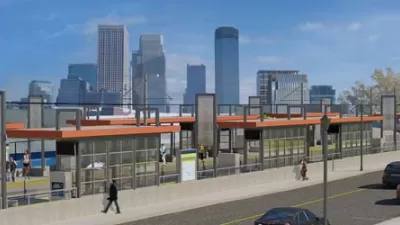Just when all seemed lost, in terms of federal funding for projects like the Southwest Light Rail Transit in the Twin Cities, the federal budget came though with needed funding.

Peter Callaghan dissects the implications of the 2017 federal budget's inclusion of funding for the Southwest Light Rail Transit (SWLRT) project from downtown Minneapolis to Eden Prairie.
According to Callaghan's premise, whether the federal funding was big news depends on which side of the SWLRT debate you're on. Supporters had cause for celebration in what had previously seemed like it would be a bleak season for federal transit funding.
For opponents, though, the news was dismissed as a blip in a long-running battle that is far from over. And with so many hurdles left to leap, they argued, the project’s relatively paltry allocation in the budget, $10 million, was hardly cause for a victory lap, especially if you account for the hostility of the state Legislature and the uncertainty surrounding one of the key local funding mechanisms.
Callaghan decides that the $10 million in funding was "probably: of course" a big deal, for several reasons. First of all, the budget preserves the transit status quo (California received transit funding too, in the form of $100 million for Caltrain electrification and $800 million total for nine projects around the state).
The article includes more about the immediate next steps and the long-term prospects for the Southwest Light Rail Transit project, so residents of the region can know what to work for as the Trump Administration gets more legislative experience under its belt.

Planetizen Federal Action Tracker
A weekly monitor of how Trump’s orders and actions are impacting planners and planning in America.

Maui's Vacation Rental Debate Turns Ugly
Verbal attacks, misinformation campaigns and fistfights plague a high-stakes debate to convert thousands of vacation rentals into long-term housing.

San Francisco Suspends Traffic Calming Amidst Record Deaths
Citing “a challenging fiscal landscape,” the city will cease the program on the heels of 42 traffic deaths, including 24 pedestrians.

Amtrak Rolls Out New Orleans to Alabama “Mardi Gras” Train
The new service will operate morning and evening departures between Mobile and New Orleans.

The Subversive Car-Free Guide to Trump's Great American Road Trip
Car-free ways to access Chicagoland’s best tourist attractions.

San Antonio and Austin are Fusing Into one Massive Megaregion
The region spanning the two central Texas cities is growing fast, posing challenges for local infrastructure and water supplies.
Urban Design for Planners 1: Software Tools
This six-course series explores essential urban design concepts using open source software and equips planners with the tools they need to participate fully in the urban design process.
Planning for Universal Design
Learn the tools for implementing Universal Design in planning regulations.
Heyer Gruel & Associates PA
JM Goldson LLC
Custer County Colorado
City of Camden Redevelopment Agency
City of Astoria
Transportation Research & Education Center (TREC) at Portland State University
Jefferson Parish Government
Camden Redevelopment Agency
City of Claremont



























